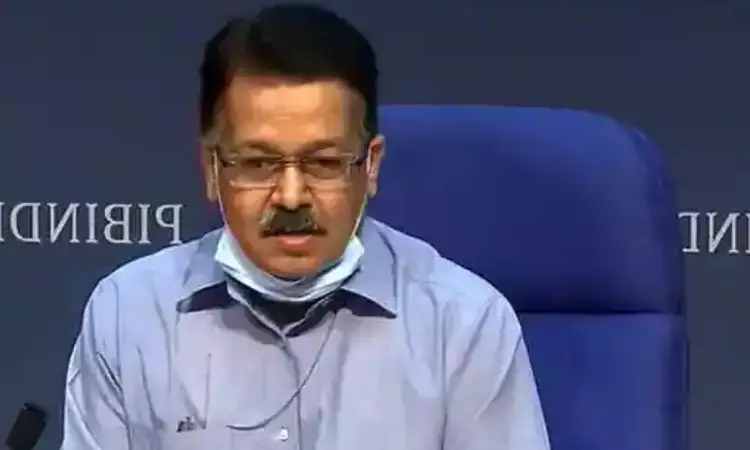- Home
- Medical news & Guidelines
- Anesthesiology
- Cardiology and CTVS
- Critical Care
- Dentistry
- Dermatology
- Diabetes and Endocrinology
- ENT
- Gastroenterology
- Medicine
- Nephrology
- Neurology
- Obstretics-Gynaecology
- Oncology
- Ophthalmology
- Orthopaedics
- Pediatrics-Neonatology
- Psychiatry
- Pulmonology
- Radiology
- Surgery
- Urology
- Laboratory Medicine
- Diet
- Nursing
- Paramedical
- Physiotherapy
- Health news
- Fact Check
- Bone Health Fact Check
- Brain Health Fact Check
- Cancer Related Fact Check
- Child Care Fact Check
- Dental and oral health fact check
- Diabetes and metabolic health fact check
- Diet and Nutrition Fact Check
- Eye and ENT Care Fact Check
- Fitness fact check
- Gut health fact check
- Heart health fact check
- Kidney health fact check
- Medical education fact check
- Men's health fact check
- Respiratory fact check
- Skin and hair care fact check
- Vaccine and Immunization fact check
- Women's health fact check
- AYUSH
- State News
- Andaman and Nicobar Islands
- Andhra Pradesh
- Arunachal Pradesh
- Assam
- Bihar
- Chandigarh
- Chattisgarh
- Dadra and Nagar Haveli
- Daman and Diu
- Delhi
- Goa
- Gujarat
- Haryana
- Himachal Pradesh
- Jammu & Kashmir
- Jharkhand
- Karnataka
- Kerala
- Ladakh
- Lakshadweep
- Madhya Pradesh
- Maharashtra
- Manipur
- Meghalaya
- Mizoram
- Nagaland
- Odisha
- Puducherry
- Punjab
- Rajasthan
- Sikkim
- Tamil Nadu
- Telangana
- Tripura
- Uttar Pradesh
- Uttrakhand
- West Bengal
- Medical Education
- Industry
India must implement global best health practices after considering local needs: Union Health Secretary

New Delhi: India is observing a significant expansion of medical and paramedical institutions wherein global best practices must be implemented after considering local needs, Union Health Secretary Rajesh Bhushan said on Friday.
He was speaking after inaugurating the 3rd National Conference 'ERMED Consortium: Digital Health Resources: A reality in the presence of Dr (Professor) Atul Goel, DGHS at the National Medical Library (NML) here.
Bhushan congratulated NML for its expansion efforts and pointed out that the overall library scenario has changed nationally and globally post COVID-19 pandemic. He said a rapid transition has been taking place, be it from print and manual learning resources to electronic forms. "But we must not lose sight of the bigger picture that India is perhaps one of the few countries in the world that are observing the significant expansion of medical institutions in recent times. Hence, we must be careful in adopting global technological practices and take into account our local needs," he said.
National Medical Library's Electronic Resources in Medicine (NML-ERMED) Consortium is the flagship electronic resources consortium by the Directorate General of Health Services (DGHS) and the health ministry, wherein access to 228 e-journals is being provided round-the-clock to 71 state and centrally funded government institutions, including the All India Institute of Medical Science (AIIMS).
While highlighting the presence of a vibrant research community in India and its technological prowess which needs to be further encouraged, the health secretary mentioned the Co-WIN platform that has been able to robustly serve not just citizens with more than 2 billion vaccine doses recorded digitally, but has been hailed as a global best practice, the statement said.
He urged the stakeholders to come up with similar digital platforms and create homegrown best practices where Indian methods and solutions dominate the digital spaces.
Bhushan reiterated the implications of the pandemic on medical teaching and care. Citing examples of electronic ICUs or tele-ICUs and teleconsultations that have become commonplace now, he emphasised that the pandemic has provided the fillip to the ecosystem of digital medical care, the statement said.
He noted that the Government of India is expanding these services by taking technical advantage of the Internet and mobile technology penetration in the country. These avenues are being pushed forward at the ground level for ensuring accessibility, affordability, equity along with the quality of healthcare services. Building on this strong groundwork, libraries must also come up with innovative best practices so that they can help cater to the needs of our medical professionals, he highlighted.
The prime focus of ERMED is helping medical colleges to comply with NMC guidelines, standardise care across all clinicians, reduce variability in care, enable safe patient care, drive appropriate drug use and prescribing behaviour, decrease medical errors, stop unnecessary diagnostic testing, shorten length-of-stay, lower mortality rates, exposure to the latest research, information development, scientific and technological progress.
Also Read:Rajesh Bhushan gets additional charge of Secretary, Department of Health Research
Medical Dialogues Bureau consists of a team of passionate medical/scientific writers, led by doctors and healthcare researchers. Our team efforts to bring you updated and timely news about the important happenings of the medical and healthcare sector. Our editorial team can be reached at editorial@medicaldialogues.in.


